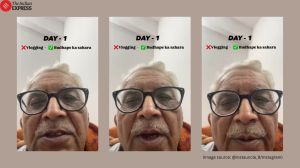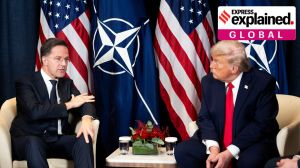Look again at Iraq
The new Security Council Resolution on Iraq sets into motion an Interim Government in Baghdad which will be handed sovereignty on June 30 by...

The new Security Council Resolution on Iraq sets into motion an Interim Government in Baghdad which will be handed sovereignty on June 30 by the US Occupation Authority. After the horrors of the past year, such a step, however imperfectly contrived, is welcome. On July 1, Ambassador John Negroponte will take over from Paul Bremer. He will be accredited, provisionally, to the new interim authority. Most countries in the US-led coalition will probably do likewise.
Countries like India will come under pressure to upgrade their relationship with the interim authority. Some clarification will come after Natwar Singh8217;s meeting with Colin Powell during former president Ronald Reagan8217;s funeral. New Delhi never closed the embassy in Baghdad, except during the war in March-April 2003, when Indian Ambassador Brij Tyagi watched the situation from Amman. After the war he resumed his post in Baghdad.
On March 8, the Ambassador made an assessment that the embassy should be closed because, according to him, a civil war was imminent in Iraq. South Block made a different determination. The embassy must continue. At a time when the world was groping for information out of Iraq, one would have expected the embassy to have played a role. Did it?
It would be interesting for Natwar Singh to have his officials put together dispatches from various Indian ambassadors giving their assessments of the period March-April-May 2003 on what is turning out to be the most far-reaching conflict since World War II. How many of our diplomats were able to predict events? Did they go woefully wrong because their primary sources of information were the occupying powers and their uncritical supporters? It could be a fascinating study of decision-making in the MEA.
When the Indian Ambassador to Baghdad was positioned in Amman, the general expectation was that American occupation would be complete by May-June 2003. The ambassador would return to Baghdad and start doing business with the victorious powers. The only first-hand report on the ground situation in Iraq the MEA has is by Secretary Rajan Abhyankar when he zigzagged around Iraq by road in June 2003 to meet senior Kurdish, Sunni leaders and US officials. Since Paul Bremer, then on a very high horse, could not find time for the Indian official, Condoleezza Rice was asked by the PMO to have the Indian Ambassador in Iraq suitably briefed. That is when the Indian embassy had its only contact with the highest US official in Baghdad. There has been no movement across the Green Zone for the Indian embassy since then.
Of course, Baghdad has not been the easiest place to find one8217;s way around. There is another complication. The Occupation Authority and the interim sovereign government are all power centers demanding ambassadorial attention. But anyone with a long term interest in Iraq must realise that the center of gravity has shifted to Southern Iraq, particularly the holy city of Najaf, the most important center for 65 per cent of Iraq8217;s population which is Shia. What arrangements can New Delhi make to establish links with Najaf and its theological schools?
It is one of the great ironies of our time that the Americans who invaded Iraq as would-be modernisers, have, by their brutality, manufactured the sort of extremism in Fallujah that would make Osama bin Laden look moderate. The mindless pursuit of Shia cleric Muqtada Sadr in the South is likely to have the same consequence. Sources linked to the Ayatullahs in Najaf see all this manufactured extremism as part of the American contingency plan for a situation after the US November elections. Not WMDs but terrorism and Islamic fundamentalism will be pursued by the same multinational forces scattered across the dozen odd bases in Iraq which have, for the time being, been yoked with the interim government. This is the kind of cynicism prevalent in the southern cities. There is no confirmation that Ayatullah Sistani has endorsed the UN resolution. His appraisal is that the current charade is only to clear the air for the November US elections.
For the past four decades New Delhi8217;s diplomatic, commercial, business focus has been on Baghdad, the Kurdish north and to an extent Basrah 8212; not Najaf and Karbala. Why? Najaf, Kufa and Karbala were only pilgrim centers. This made them progressively less important even for consular work.
With the decline of the Shia aristocracy in and around Awadh, high profile interest in the three holy cities declined. Time was when the Nawab of Rampur and the Raja of Mehmoodabad had retainers and pilgrim centers and valuable property in Najaf and Karbala. Shia institutions in Lucknow had abiding links with Najaf. Nearly forty years of a Baathist regime which did not encourage religion also resulted in a dwindling pilgrim traffic.
There are not many people in South Block, therefore, with the sort of 8216;8216;feel8217;8217; for the Shia pilgrim centers which would give them access to the mind of, say, Ayatullah Sistani. Yesterday8217;s monastic recluses will be the guides for Shia politicians in the future. They must be accessed.
The convoluted plots within plots must be understood. Where, for instance, is Ahmad Chalabi now? Sheikh Ghazi at Yawar, president of the interim Iraqi government, is a Sunni alright, but closer to the Syrian Shamar tribes. Is this by design? Iyad Allawi8217;s name was treated with derision in Arab newspapers: 8216;8216;CIA agent becomes Iraq prime minister8217;8217;. But Iranians appear to have welcomed the appointment. Because he is a Shia?
OPEC and G-8 Summits have been synchronised with the UN resolution. What should New Delhi do? Of course, renovate the embassy in Baghdad. Tyagi and his team have worked under tough conditions. They deserve a change. New Delhi requires new analytical tools. No other nationality has such broad acceptability in Iraq as Indians do. We have friends behind the Green Zone, in the old Baathist establishment, among Kurds and Southern Shias.
Invaders and occupiers have been our primary sources of information. This must be corrected. New Delhi must appoint a special envoy, preferably from within the MEA, who is in constant touch with Teheran, Ankara, Amman, Riyadh, Cairo, Jerusalem, OPEC and OIC.
- 01
- 02
- 03
- 04
- 05






























